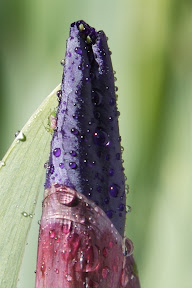 The weather finally decided to clear off last night, and this morning the sun was out. A pleasant change after the past week of gloom! So I grabbed my camera and wandered out to the iris bed around my mailbox. They've not opened yet (but they're budding) and in the morning light they look quite lovely. So I set up the tripod and snapped a few pictures.
The weather finally decided to clear off last night, and this morning the sun was out. A pleasant change after the past week of gloom! So I grabbed my camera and wandered out to the iris bed around my mailbox. They've not opened yet (but they're budding) and in the morning light they look quite lovely. So I set up the tripod and snapped a few pictures.Only to discover two things. First, that I have aphids on my irises! You can see them pretty clearly in the picture to the right (if you click on it and look at the full-size image in my gallery). I'll have to either find some ladybugs to drop on that bed or get a reasonable insecticide to kill them off. Don't like using insecticides much, but somehow it seems much simpler than dealing with ladybugs (mom got some a few years back - they were a pain to "deploy"). They're kinda cool looking bugs (aphids) but I don't want them on my plants!
 Second, that none of my pictures came out sharp. I rather expected that, on a tripod and on a calm day, with a shutter speed of 125 and an aperture of f8, using a remote switch, my pictures would be sharp. But they weren't. You can see the lack of sharpness if you click on the picture above. (The picture to the left is scaled down more from its original size, so it's harder to see the lack of sharpness.) But the one above looks like it's out of focus - but with the enhanced depth of field in shooting at f8, any mistake in focus acquisition should have been compensated. And I look several (and made the camera refocus several times). One at least should have hit!
Second, that none of my pictures came out sharp. I rather expected that, on a tripod and on a calm day, with a shutter speed of 125 and an aperture of f8, using a remote switch, my pictures would be sharp. But they weren't. You can see the lack of sharpness if you click on the picture above. (The picture to the left is scaled down more from its original size, so it's harder to see the lack of sharpness.) But the one above looks like it's out of focus - but with the enhanced depth of field in shooting at f8, any mistake in focus acquisition should have been compensated. And I look several (and made the camera refocus several times). One at least should have hit!I've noticed similar, recently, when shooting with the lens stopped down to f22. But that was a picture of a tree, taken at some distance from the subject. I thought it odd but when I opened the lens up to f9, sharpness returned. Wide open the lens is quite sharp, and usually sharpness and aperture increase directly: the more stopped down the lens is, the sharper is it. At least, that's what I remember reading. I should also mention that when I first got the lens, I was blown away by its sharpness. It's a Canon EF 24-105 F4L IS USM - a very high-quality lens.
The lens doesn't seems dirty, either. But I plan to remove the filter and shoot something at various f-stops and various shutter speeds to see if perhaps it is interference from the filter. It's a high-quality filter.... Really shouldn't be reducing the sharpness of the lens. I'll report on that when I have results.

No comments:
Post a Comment